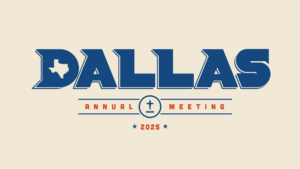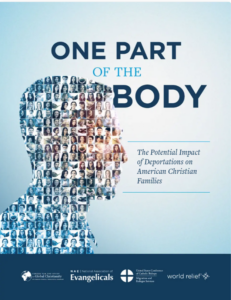
Northeast Church,
Braselton, Georgia
 Russ Harbin, pastor of Northeast Church in Braselton, Georgia, came to see the importance of the Cooperative Program through the merger of two churches into the one he currently pastors.
Russ Harbin, pastor of Northeast Church in Braselton, Georgia, came to see the importance of the Cooperative Program through the merger of two churches into the one he currently pastors.
Harbin became pastor of Hoschton Baptist in Braselton in January 2010. Located just down the road was Zion Baptist Church, a congregation with dwindling membership. Each church had a need that the other could meet.
“They [Zion] had what we needed, a building,” Harbin said. “They [Zion] wanted what we [Hoschton] had, people.”
So Zion and Hoschton became Northeast Church, which formally launched in December 2011.
“God has done more . . . by bringing us together than when the churches were on their own,” he said.
Despite his love of cooperation, CP wasn’t at the forefront of Harbin’s thinking when he began his pastorate. As an itinerant evangelist for fifteen years before arriving at Hoschton, his focus was on other aspects of Southern Baptist life.
“It was really never a focus of mine,” he said of CP. “I knew it existed, but I didn’t embrace it. . . . You can’t lead people to believe in something like the Cooperative Program if you don’t believe in it yourself.”
Harbin began to see the importance of the CP through the work of Georgia Baptist Convention executive director Robert White.
“Being around him [White], I got to see what CP looked like and what it meant,” Harbin said. “We can do more together than we can do alone. I was challenged; I was encouraged by example.”
In response to a challenge by White, Northeast increased its CP giving to 10 percent of its undesignated receipts. In contrast to the $34,000 Hoschton gave through CP in 2011, Northeast gave $70,000 in 2012.
Harbin has focused on teaching his church the impact of cooperative giving and the ministry vision of the Georgia Baptist Convention.
“We’re living out the vision of the Cooperative Program by taking separate churches, seeing them united and brought together for greater ministry impact,” he said. “This year, we anticipate we will give over $100,000 through the Cooperative Program.”
In addition to cooperative giving, Northeast has launched successful ministries in its own community—like “Good News Clubs,” after-school programs that teach children the Bible.
“We do events that are very intentional—no strings attached,” Harbin said. “We’re trying to be the church. We do events designed to be there for the community, to love them. They will come to the church when people see you love them.”
Kingdom Covenant Church,
Miami, Florida
 Patrick Coats, founding pastor of Kingdom Covenant Church in Miami, Florida, sees the Cooperative Program helping to fuel the diverse ministries of the Southern Baptist Convention, and few places in America are as diverse as Miami.
Patrick Coats, founding pastor of Kingdom Covenant Church in Miami, Florida, sees the Cooperative Program helping to fuel the diverse ministries of the Southern Baptist Convention, and few places in America are as diverse as Miami.
Kingdom Covenant meets in a movie theatre and strives to create a church culture that meets the needs of those around them.
“We’ve been able to reach people who have little exposure to church culture and present a clear Gospel,” Coats said, adding, “Our approach to church is pretty simple: no drama, no gimmicks, just Christ.”
Though some view foreign missions as merely “going,” Coats notes that in many ways, the nations are “coming” to Miami due to its great diversity. This opens doors to share the Gospel with people from cultures where it is little known, he said.
A church only three years old, Kingdom Covenant gives 8 percent of its undesignated receipts through CP and 2 percent to the local association.
To spur CP giving, Coats updates the church on how funds are being used for international missions, church planting, disaster relief, and many other ministries.
“We celebrate how our giving helps our church participate in areas around the country where we would not otherwise have the opportunity to have an impact,” Coats said.
Emphasis on the Cooperative Program begins with the leader of the church, according to Coats.
“I believe our pastors have to have a strong passion for it and herald it,” he said of CP. “If that happens, the members will follow.”
First Baptist Church,
Greeneville, Tennessee
 Although the local population is not growing, David Green, pastor of First Baptist Church in Greeneville, Tennessee, marvels that the church has grown in almost every area of its ministry. Its attendance has more than doubled, from 350 in 1999 when Green became pastor to 850 in the current year.
Although the local population is not growing, David Green, pastor of First Baptist Church in Greeneville, Tennessee, marvels that the church has grown in almost every area of its ministry. Its attendance has more than doubled, from 350 in 1999 when Green became pastor to 850 in the current year.
“Every week, we are either seeing someone make a public profession of faith or we are blessed with the opportunity to start our services with baptisms,” he said. “God is changing lives and our community.”
Green said First Baptist is a “church without walls”—ministering to the community through disaster relief; deaf ministry; active children’s, youth, adult, and senior adult ministries; a Fall Festival; Christian musical events; meals for the local college football team; and local youth mission projects.
The church also emphasizes the Cooperative Program by participating in CP Day. Green regularly preaches and teaches on biblical stewardship and the importance of proportional giving.
“Pastors need to be passionate and excited about it in their teaching and not just leave it to other groups in the church,” he said. “CP giving should be an exciting part of the DNA of every Southern Baptist Church. It can and should be taught as one of the greatest privileges of the local church.”
Currently, First Baptist gives 13 percent of its undesignated receipts through CP.
“There has not been a more successful model of funding missions in all of church history than that of the Cooperative Program of the Southern Baptist Convention,” he said.














